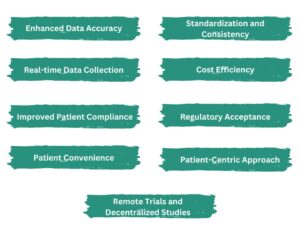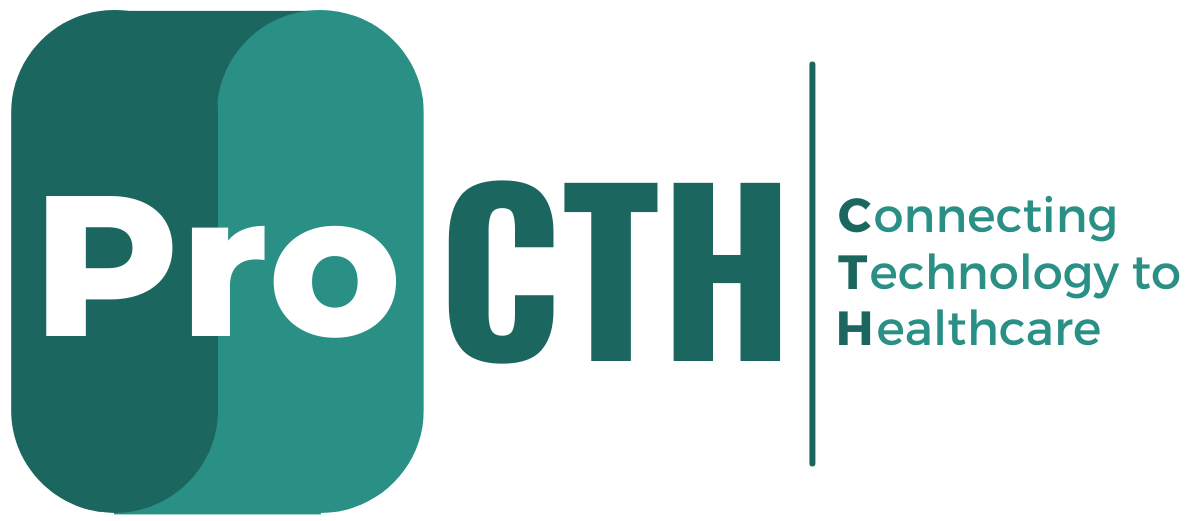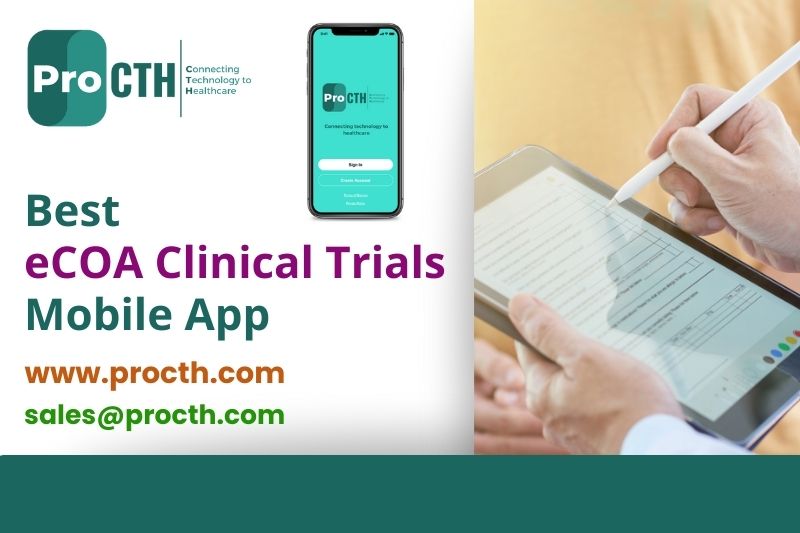ProCTH is the Best eCOA Clinical Trials Mobile App with its user-friendly interface and advanced features, it offers an unparalleled experience. The app’s robust capabilities streamline data collection, enhance patient engagement, and ensure accurate and efficient trial monitoring.
Introduction:
Its advanced features, user-friendly interface, and robust capabilities make it a top choice for researchers and clinical trial professionals. With seamless electronic data capture and real-time patient-reported outcomes, ProCTH streamlines data collection, enhances accuracy, and accelerates the overall trial process.
Its intuitive design ensures easy navigation for both patients and researchers, promoting higher patient engagement and compliance. When it comes to selecting the best eCOA Clinical Trials Mobile App, ProCTH’s impressive performance and comprehensive functionalities make it a preferred and reliable option for driving successful clinical trials.
The main components of eCOA include electronic versions of patient diaries, questionnaires, and assessments, which are delivered and completed on various electronic devices like smartphones, tablets, or computers. This technology allows for real-time data capture, improved data accuracy, enhanced patient compliance, and streamlined data management, thereby leading to more efficient and reliable clinical trials.
The Importance of eCOA Clinical Trials:
eCOA clinical trials refers to the use of electronic devices, such as smartphones, tablets, or computers, to collect patient-reported outcomes and other clinical trial data. eCOA is becoming increasingly important in clinical research for several reasons:

1) Enhanced Data Accuracy:
eCOA systems reduce the potential for errors and inaccuracies associated with paper-based data collection. Patients can directly input their responses, reducing transcription errors and data entry mistakes.
2) Real-time Data Collection:
eCOA allows for real-time data collection, enabling researchers to monitor patient progress and safety during the trial promptly. This can lead to more informed decision-making and quicker identification of potential adverse events or issues.
3) Improved Patient Compliance:
eCOA systems can be designed to incorporate reminders and alerts for patients to complete assessments, improving patient compliance with data reporting requirements. This helps maintain high-quality data and reduces missing data points.
4) Patient Convenience:
Patients can complete eCOA assessments remotely, reducing the need for in-person visits and potentially increasing patient participation and retention in the study.
5) Standardization and Consistency:
eCOA systems provide standardized instructions and response options, ensuring consistency in data collection across study sites and reducing variability in data interpretation.
6) Cost Efficiency:
While implementing eCOA systems may require an initial investment, it can lead to cost savings in the long run due to reduced paperwork, data entry, and monitoring efforts.
7) Regulatory Acceptance:
Regulatory authorities, such as the U.S. Food and Drug Administration (FDA) and the European Medicines Agency (EMA), have recognized the benefits of eCOA and have issued guidance and recommendations for its use in clinical trials.
8) Patient-Centric Approach:
eCOA allows for patient-reported outcomes, providing valuable insights into patient experiences, symptoms, and quality of life. This patient-centric clinical trials enhances the overall understanding of treatment efficacy and patient preferences.
9) Remote Trials and Decentralized Studies:
In recent times, there has been an increasing interest in conducting remote and decentralized clinical trials. eCOA plays a crucial role in enabling such studies by facilitating remote data collection and reducing the burden on patients and study sites.
The Benefits of using eCOA Clinical Trials Mobile App
Using a mobile app for eCOA in clinical trials can offer numerous benefits for both researchers and participants. eCOA involves the use of electronic devices like smartphones or tablets to capture patient-reported outcomes, medical information, and other data during clinical trials. Here are some of the advantages of using mobile apps for eCOA in clinical trials:
Enhanced Data Accuracy:
Mobile apps can minimize errors and missing data compared to traditional paper-based methods. The real-time data capture ensures that data is entered accurately, reducing the need for data entry and transcription, which can introduce errors.
Real-time Data Collection:
Mobile apps enable instant data collection, allowing researchers to access and analyze data in real-time. This feature helps researchers detect any adverse events or trends early, leading to timely interventions and improved patient safety.
Improved Patient Compliance:
Mobile apps can incorporate reminders and notifications to prompt patients to complete assessments, take medications, or attend study visits. This can significantly improve patient compliance and reduce the risk of missing data points.
Remote Monitoring and Access:
Mobile apps facilitate remote data collection, making it easier for participants to contribute to the study from the comfort of their homes. It also allows researchers and clinicians to remotely monitor patients’ progress and adherence to the study protocol.
Cost-effectiveness:
While the initial setup of eCOA systems may require an investment, the overall costs can be lower in the long run due to reduced data entry and paper-related expenses. Additionally, the elimination of site visits for data collection can lead to cost savings.
User-friendly Interface:
Mobile apps can be designed with user-friendly interfaces, making it easier for patients to navigate and complete assessments, especially for older adults or individuals with limited technical experience.
Efficient Data Management:
eCOA mobile apps often have built-in data management features, making it easier to organize, store, and analyze large amounts of data securely.
Real-world Data Collection:
Mobile apps allow data collection in a patient’s natural environment, capturing real-world experiences, and potentially improving the ecological validity of the study.
Increased Patient Engagement:
The interactive nature of mobile apps can lead to increased patient engagement throughout the study, as participants may feel more connected to the research process.
Environmental Sustainability:
Utilizing mobile apps for eCOA reduces the need for paper-based assessments, contributing to a more sustainable and eco-friendly approach to clinical trials.
Key Features to Look for in an eCOA clinical trials mobile app
eCOA clinical trials mobile apps play a crucial role in modern clinical trials and healthcare research. These apps are designed to collect patient-reported outcomes (PROs) and other essential data electronically, improving data accuracy and Patient Engagement. When evaluating an eCOA mobile app, consider the following key features:
-
User-friendly interface:
An intuitive and easy-to-use interface is essential to ensure that patients can navigate the app with minimal training or assistance. Look for a clean layout, large buttons, and clear instructions to enhance the user experience.
-
Cross-platform compatibility:
The app should be available for both iOS and Android devices to cater to a broader patient population and ensure compatibility with a variety of smartphones and tablets.
-
Offline data capture:
Clinical trials may involve patients in remote areas or with limited internet connectivity. An eCOA mobile app should have the capability to store data offline and automatically sync it when the device reconnects to the internet.
-
Multilingual support:
If your study involves participants from different regions or countries, the app should support multiple languages to accommodate diverse patient populations.
-
Data security and compliance:
Given the sensitive nature of health-related data, the app should adhere to data protection regulations (e.g., GDPR, HIPAA) and ensure secure data transmission and storage.
-
Validation and regulatory compliance:
The eCOA app should be validated for its intended use and comply with relevant regulatory guidelines, such as those from the Food and Drug Administration (FDA) or European Medicines Agency (EMA).
-
Customizable assessments:
The app should allow researchers to customize assessments based on the specific needs of their study. This includes various question types (e.g., Likert scales, visual analog scales), skip patterns, and branching logic.
-
Real-time data capture:
The app should enable the collection of data in real-time, allowing researchers to access and analyze patient-reported data as it is collected.
-
Notifications and reminders:
Incorporate features that can send reminders to patients to complete assessments or take medication, helping improve compliance and reducing missing data.
-
Integration with other systems:
Seamless integration with existing Electronic Data Capture (EDC) systems or clinical trial management software streamlines data flow and reduces manual data entry errors.
-
Accessibility features:
Consider apps that are designed with accessibility features like voice-to-text input or support for screen readers to accommodate patients with disabilities.
-
Data visualization and reporting:
The app should offer features that enable researchers to visualize and analyze data efficiently through charts, graphs, and customizable reports.
-
Training and support:
Look for an eCOA app provider that offers comprehensive training materials, customer support, and assistance to patients and study sites to ensure a smooth user experience.
-
Patient engagement tools:
Gamification or other interactive elements can enhance Patient Engagement and adherence to the app, leading to more reliable data collection.
-
Scalability:
Ensure that the app can handle the number of participants in your study and is capable of scaling up if the number of users increases.
Tips on Selecting the Right eCOA Mobile App Provider
Selecting the right eCOA clinical trials mobile app provider is crucial for the success of your clinical trial or research study. An eCOA mobile app can streamline data collection, improve patient engagement, and enhance data accuracy. Here are some tips to help you choose the right eCOA mobile app provider:
Experience and Reputation:
Look for a provider with a proven track record in the eCOA industry. Research their experience, reputation, and client testimonials. A well-established provider with experience in multiple studies is more likely to offer a reliable and robust solution.
Regulatory Compliance:
Ensure that the app and the provider comply with relevant regulatory standards, such as FDA guidelines, GCP (Good Clinical Practice), GDPR (General Data Protection Regulation), and HIPAA (Health Insurance Portability and Accountability Act). Compliance is vital for data integrity and patient confidentiality.
User-Friendly Interface:
The eCOA mobile app should have an intuitive and user-friendly interface for both patients and researchers. A complex or confusing app may lead to data entry errors and patient dropouts.
Compatibility and Accessibility:
Verify that the app is compatible with various devices and operating systems (iOS, Android, etc.). It should be accessible to patients using smartphones and tablets, as this enhances patient compliance and engagement.
Customization:
Different studies have different requirements. Ensure that the provider offers customization options to tailor the app to your study’s specific needs. This may include different languages, question types, and study-specific branding.
Integration with Existing Systems:
Check if the eCOA app can integrate seamlessly with your existing data management and clinical trial systems. Integration facilitates data transfer, analysis, and reporting.
Data Security:
Data security is paramount in clinical research. Verify that the provider employs robust security measures, such as encryption, secure data transmission, and access controls, to protect patient data.
Data Quality and Validity:
The eCOA app should have built-in mechanisms to ensure data quality and validity. This may include data validation rules, edit checks, and real-time monitoring of data.
Training and Support:
Adequate training and ongoing support should be provided to both the research team and patients. This ensures that all users can navigate the app effectively and address any technical issues promptly.
Scalability and Flexibility:
Consider whether the eCOA app can accommodate changes in study protocols, patient populations, or data requirements. A flexible and scalable solution can adapt to the evolving needs of your research.
Cost and Budget:
While cost is an essential factor, it should not be the sole determining factor. Balance the cost with the quality of the service and the value it brings to your study.
Pilot Testing:
Before fully committing, consider conducting a pilot study or trial using the eCOA app. This allows you to assess its performance, usability, and compatibility with your study’s objectives.
Conclusion:
In today’s rapidly advancing world of clinical research, the key to achieving swift and successful outcomes lies in adopting cutting-edge technologies. Embracing the best eCOA mobile app solution is undeniably the way forward for accelerating your clinical trial success. With its seamless integration of electronic data capture and patient-reported outcomes, this innovative solution empowers researchers, clinicians, and patients alike.
By enabling real-time data collection, efficient communication, and remote monitoring, the eCOA mobile app streamlines the entire trial process. Patients benefit from the convenience of submitting data via their mobile devices, enhancing compliance and Patient Engagement. Researchers gain access to accurate, up-to-date information, allowing for timely analysis and decision-making.
Ultimately, ProCTH eCOA clinical trials mobile app solution significantly expedites the pace of clinical trials, leading to more rapid insights and faster drug development. Embrace the future of clinical research and unlock the full potential of your clinical trials with the best eCOA clinical trials mobile app solution.

